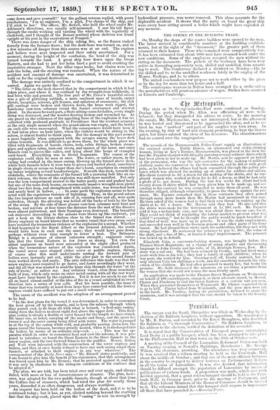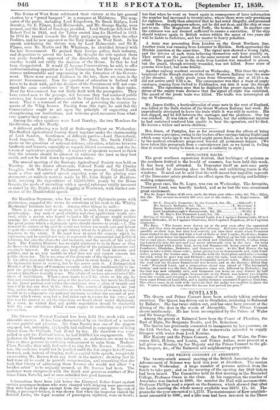Vrouturial.
The vacant scat for South Shropshire was filled on Wednesday by the election of Sir Baldwin Leighton, without opposition. He was proposed by Mr. R. Burton, and seconded by Sir Rouse Broughton, who described Sir Baldwin as "a thorough Conservative." Sir Baldwin Leighton, in his address to the electors, verified the definition of his seconder.
It is stated that the Conservatives of Liverpool propose entertaining Lord Derby at a public banquet, which has been arranged to take place in the Philharmonic Hall in that town on the 29th of October next.
A meeting of the Council of the Lancashire Reformers' Union was held on Tuesday evening at Newalfs Buildings, Manchester ; Mr. George Wilson, the chairman, presiding. The attendance was very numerous. It was resolved that a reform meeting bo held in the Free-trade Hall about the middle of October ; and that one of the most efficient lecturers in the country be engaged to deliver lectures on Parliamentary Reform in- all the towns of Lancashire. It was also decided that information should be diffused amongst the population of Lancashire by means of publications of various kinds. A proposition was made, which met with decided approval, that a great reform banquet should be held in the Free- trade Hall, in January next, prior to the meeting of Parliament, and that all the Liberal Members of the House of Commons should be invited to it. The reformers intend that this banquet shall surpass in importance all those that have preceded it.—Aforning Peper. The Tories of West Kent celebrated their victory at the late general election by a "grand banquet" in a marquee at Maidstone. The mag- nates of the party, including Lord Kingsdown, Sir Brook Bridges, Lord Darnley, Sir E. Filmer, Lord Holinesdale, and Mr. George Hardy, were present, and the Earl of Stanhope presided. Lord Stanhope followed Sir Robert Peel in 1846, and the Tories ousted him for Hertford in 1852. In 1858 he veered towards the Derby party, separating from the other Peelites, and he now appeared as the Tory leader in West Kent. In his speech celebrating the victory won by Lord Holmesdale and Sir E. Filmer, over Mr. Martin and Mr. Whatman, he identified himself with the late Government. He praised their foreign policy, their industry, and disposition to amend the laws. He thought the vote against them not justly founded, approved of the dissolution, and hoped that the country would not ratify the decision of the House. In that he had been disappointed. It would ill become Conservatives, he said, to offer undiscriminating opposition to Lord Palmerston, but there were circum- stances unfavourable and unpromising in the formation of his Govern- ment. There were several Irishmen in the late, there are none in the present Government. Now the question of education in Ireland will have to be dealt with, and the decision of the Government will not com- mand the same confidence as if there were Irishmen in their ranks. Next the Government has not fairly dealt with the prerogative. They have raised men to the peerage, not because they had rendered public services, but because no places could be found for them in the Govern- ment. That is a remnant of the system of governing the country by means of the Whig houses. Passing from this topic he said that the Conservatives ought to act upon the principle of supporting and strengthening our institutions, and welcome good measures from what- ever quarter they may come.
Among the other speakers were Lord Darnley, the two Members for the division, and Mr. Hardy.
A different gathering was held at Stoke-upon-Trent on Wednesday. The Stafford Agricultural Society dined together under the chairmanship of Lord Sandon. Gentlemen of different parties—Lord Shrewsbury, Lord Ingestre, Mr. Bramley Moore, Mr. Bass, Mr. Smith Child— spoke on the questions of national defence, education, relations between landlords and tenants, especially as regards liberal covenants, 'and the in- terests of agriculture generally. A majority of speakers seemed to think that the tenants should be allowed to cultivate the land as they best could, and not be tied down by capricious rules.
The annual meeting of the Banbury Agricultural Society was held on Tuesday. At the dinner afterwards, Colonel North and Sir Charles Douglas, both Members of Parliament, were present. Colonel North made a close and spirited speech exposing some of the glaring mis- statements on military matters made by Mr. John Bright at Hudders- field, touching the expenditure of 12,000,0001. yearly by the Horse Guards, the mode of recruiting with a special reference totally incorrect as stated by Mr. Bright, and the flogging at Woolwich, with further cor- rection of the Huddersfield speech.
Sir Hamilton Seymour, who has filled several diplomatic posts with distinction, expanded the views he entertains of his craft to the Whitby Mechanics' Institute last week. Among other things he said— 'f here is no great craft or mystery in it, he said, but it requires an ap- prenticeship. Any man of good abilities and close application would suc- ceed, while a person who hoped to lead a life of pleasure would neither manage his own affairs nor those of his country well. The following are the great points which a diplomatic agent should observe or avoid :-1. The moment he arrives at his post he could not bestow too much care and labour to gain the confidence of the people among whom he is placed ; that is the keystone to the whole. 2. lie must bear in mind the country w.ilich he represents, and be careful not only to represent the commercial and political interests, but also the character and manners, and the morals of his native land. The Foreign Minister has no right whatever to do in Rome as they do there—to follow his own pleasure, forgetful of his national character and country's interest. He must also keep clear of all local interests and politics, and in no way meddle in what does not and cannot concern his public character. These are some of the elements of the diplomatist It has often been said that there was a ghost in every house ; the ghost in the diplomatic house is secrecy, but he has never seen it. A distinguished Member of the House of Commons recently asked him confidentially to im- part the principle of mystery in his science, and he had some difficulty in assuring him there is really none. The affairs of nations are conducted like those of individuals. When a man wants to sell his estate or his pig, he does not conduct in detail the sales at the market- cross, but meets his friend in the inner parlour and settles the conditions over a glass of brandy and water if he has any dust in his throat. The secrets of diplomacy are just this, and to deprive our diplomatists in such transactions of so much secrecy would be to compromise our national interests, to refuse the amount of pro- tection which every man but a fool takes care to secure for his own ; and this was his answer to all the objections we heard about secret diplomacy. In a word, lie wished that any public negotiation should be conducted with the same advantage which a man enjoys in conducting any private 1m:section.
The Gloucester Musical Festival has been held this week with con- siderable success. It has been characterized by an incident of a nature at once painful and pleasing. Mr. Sims Reeves was one of the singers engaged, but, unhappily, his health had suffered in consequence of being driven from the Oatlands Park Hotel by fire. He therefore was com- pelled to quit the Festival before he had fulfilled his engagements. The audience on Thursday was very indignant, as audiences are wont to be. Two or three persons in authority endeavoured to calm them. Madame Clara Novelle, they said, had agreed to sing for Mr. Reeves. Neverthe- less, the audience would not be pacified until the fair singer herself came forward, and, instead of singing, made a capital little speech, completely exonerating Mr. Reeves from any fault in the matter ; showing that he had done all he could to provide compensation, and remarking that she took that liberty of addressing them because she would not allow " brother artist" to be unjustly accused, as Mr. Reeves had been. The audience were enraptured with the frank and generous conduct of Ma- dame Clara Novelle, and at once subsided into good humour. but that when he went on board again in consequence of later information the number had increased to twenty-nine, where there were only provisions for eighteen. Duffy then admitted that he had acted illegally, and promised to send the extra passengers ashore, yet he did not do so, and the ship at once put to sea. The Magistrate fined Duffy, the broker, 601. In another case the evidence was not deemed sufficient to ensure a conviction. If the ship should venture again in British waters within the space of two years she will be liable to forfeiture, and her master to heavy penalties.
A train was proceeding from London on the Great Northern line. Another train was running from Leicester to Hitchin. Both approached the Hitehin junction at the nine time. The signal man showed a wrong light, and the drivers of each train believing themselves safe bore steadily on. They arrived on the junction at the same moment and dashed into each other. The guard's van in the train from London was smashed to pieces, but the guard, though severely, wounded, was not killed. Some score of persons were hurt, but none fatally.
'Another railway accident occurred on Wednesday. This time the neigh- bourhood of the Slough station of the Great Western Railway was the scene of the disaster. A night goods train from Gloucester, due at 12.15 a.m. did not arrive until 2.25 a.m. The consequence was that a train of empty carriages, coming from Oxford to Paddington, ran into it near the Slough station. The signalman says that he displayed the proper signals, but the driver of the empty train declares that the signal all right was exhibited. The guard of the goods train was killed. The traffic was interrupted all day on Wednesday.
Mr. James Griffin, a horticulturalist of some note in the west of England, was killed at the Bath station of the Great Western Railway last week. He imprudently attempted to leave the train while it was still in motion. His foot slipped, and he fell between the carriages and the platform. One leg was crushed. It was taken off at the hospital, but the additional injuries he had sustained rendered him unable to bear the operation, and he died. He leaves a widow and seven children.
Mrs. Jones, of Pantglas, has so far recovered from the effects of being thrown over a precipice, owing to the leaders of her carriage taking fright (and which some weeks ago it was feared might prove fatal), as to be pronounced by the medical attendants progressed beyond all permanent danger. [We have taken this paragraph from a contemporary just as we found it, feeling that it would be wrong to touch so great a curiosity in style.]



























 Previous page
Previous page